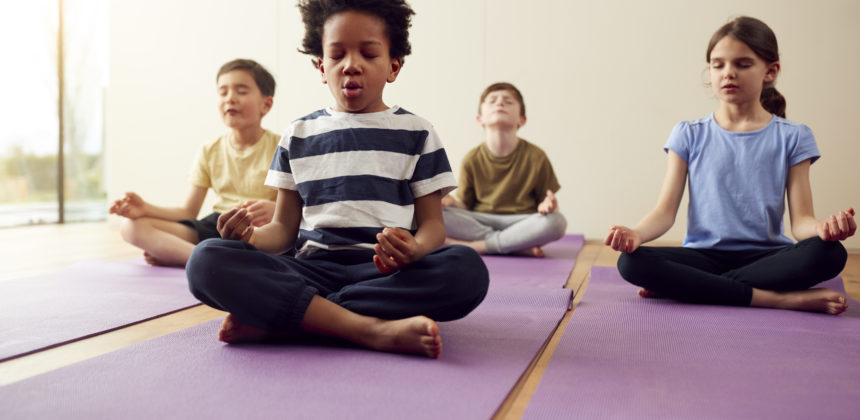Using Meditation For School Success

In today’s society, everyone seems to be in a rush or distracted. It is easy to become overwhelmed with information, ideas, and a neverending to-do list.
Children are affected as well. They have high-stress levels due to factors such as an unstable learning landscape because of COVID-19, extracurriculars, social media, their own social lives, and responsibilities at home. Their developing brains can have difficulty keeping up and prioritizing time each day to relax and focus on themselves without distractions.
If stress levels are not appropriately managed, cognitive development and functions, such as short- and long-term memory and information processing can be negatively affected; both are essential for academic success.
MEDITATION AND OUR BRAINS
Meditation rests the mind, body, and spirit, causing numerous well-being benefits. Mindfulness meditation, specifically, has gained popularity in recent years and teaches the ability to slow down racing thoughts, let go of negativity, and calm both your mind and body.
A study in Consciousness and Cognition revealed that participants who meditated for 20 minutes for four days showed lowered stress levels, as well as significant improvements in memory and cognition. Those who meditated also scored as much as ten times better on a working memory task. By flexing your memory muscle in meditation, your information storage mechanisms multiply, ensuring that your brain retains the ability to store new memories.
CHILDREN CAN BENEFIT, TOO!
For growing brains, meditation has a lot of promise for children versus what it has for adults. Kids are more receptive and willing to try new things, whereas adults have a harder time relaxing and focusing on turning off their inner dialogue.
Not only does meditation improve short- and long-term memory, but there are other benefits as well:
- Enhances empathy
- Develops better problem-solving and decision-making skills
- Improves sleep
- Meditation decreases cortisol levels, which help with stress management
- Promotes self-image and self-worth
- Increases attention span and focus
- Can reduce pain sensations in the body
- Helps manage mental illnesses such as depression, anxiety, and ADHD (source).
MEDITATION TIPS
- Practising meditation is like a muscle; it gets stronger the more it’s done.
- Your child is more likely to adopt the habit if you also implement meditation into your daily routine.
- Meditating in a comfortable place away from distractions grants the ability to focus on observing rather than thinking. This helps teach how to be present in daily life.
- Thoughts will forever be in mind; the key is not to change them but to acknowledge them and give the mind some space to look at the angry thoughts and refocus itself.
- Let the body breathe and focus on the breath pattern, no need to change or direct it.
- Use a digital app like Headspace that will help with guided meditation. This is also a great option if for progress tracking. There are other ways to make meditating a bit easier, such as books, audio recordings, and Youtube videos. Start with using one consistently to build the habit.
- The practice’s length of time and frequency can vary, but the following time frames are recommended: Preschool children: a few minutes per day; Gradeschool children: 3-10 minutes twice a day; Teens: 5-45 minutes per day or more based on preference. (source).
- Encourage your child to incorporate deep breathing at bedtime or before answering a difficult question in class. Deep breaths can also help reduce anxiety before a big event or performance.
OTHER WAYS TO HELP WITH MEMORY
If you’re looking for other methods for improving memory, try out these tips! It’s important to find an ideal strategy that works best for your child to boost motivation and improve school performance.




